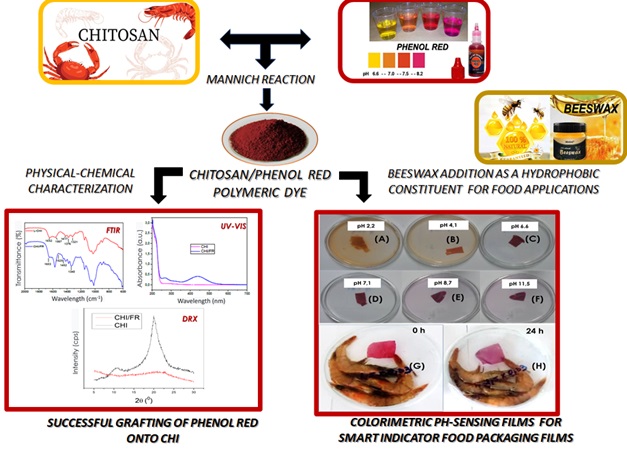Development of pH indicator films based on chitosan and beeswax
Keywords:
quitosano; rojo fenol; cera de abejas; tinte polimérico; películas indicadoras de pH.Abstract
A pH-sensitive polymeric dye was synthesized by grafting phenol red onto chitosan using a simple methodology. Successful grafting is confirmed by physical-chemical techniques. From the polymeric dye obtained, pH indicator films were developed with the addition of beeswax. The influence of the concentration of chitosan and beeswax on the humidity and water vapor permeability of the films was evaluated. The lowest moisture values of the formulated films were obtained for lower concentrations of wax and chitosan. However, the permeability was lower at higher wax content, regardless of the chitosan content. The colorimetric capacity of the best film obtained changed in the expected pH range and in contact with shrimp used as model food. Therefore, the films obtained suggest their possible food applications.
References
ANDRES-BELLO, A. et al. “Effect of pH on color and texture of food products”. Food Engineering Reviews. 2013, 5(3), 158–170. https://doi.org/10.1007/s12393-013-9067-2
ZHAO, X. et al. “A nature pH indicator with high colorimetric response sensitivity for pork freshness monitoring”. Food Bioscience. 2024, 57, 103519. https://doi.org/10.1016/j.fbio.2023.103519
ROY, S.; RHIM, J. W. “Anthocyanin food colorant and its application in pH-responsive color change indicator films”. Crit. Rev. Food. Sci. Nutr. 2021, 61(14):2297-2325. https://doi.org/10.1080/10408398.2020.1776211
FLEISCHMANN, C., LIEVENBRÜCK, M., Y RITTER, H. “Polymers and dyes: Developments and applications”. Polymers. 2015, 7(4): 717–746. https://doi.org/10.3390/polym7040717
AIDER, M. “Chitosan application for active bio-based films production and potential in the food industry: Review”. Lwt-Food Sci Technol. 2010, 43(6): 837-842. https://doi.org/10.1016/j.lwt.2010.01.021
FAZILOVA S. A., YUGAI S. M., RASHIDOVA S. S. “Structural investigation of polysaccharides and nanocompositions based on them”. Russ J. Bioorganic Chem. 2011, 37(7): 786-790. https://doi.org/10.1134/S1068162011070053
ARGYRI, AA. et al. “Potential of a simple HPLC-based approach for the identification of the spoilage status of minced beef stored at various temperatures and packaging systems”. Int. J. Food Microbiol. 2011, 150(1): 25-33. https://doi.org/10.1016/j.ijfoodmicro.2011.07.010
BAUTISTA-BAÑOS, S. et al. “Chitosan as a potential natural compound to control pre and postharvest diseases of horticultural commodities”. Crop. Protection. 2006, 25(2): 108-118. https://doi.org/10.1016/j.cropro.2005.03.010
BAUTISTA-BAÑOS, S. et al. “Chitosan: a versatile antimicrobial polysaccharide for fruit and vegetables in postharvest-a review”. Revista Chapingo. Serie horticultura. 2017, 23(2): 103-122. https://doi.org/10.5154/r.rchsh.2016.11.030
BONILLA, J. et al. “Physical properties of chitosan-basil essential oil edible films as affected by oil content and homogenization conditions”. Procedia Food Science. 2011, 1: 50-56. https://doi.org/10.1016/j.profoo.2011.09.009
CHALITANGKOON, J., Y MONVISADE, P. “Dual pH/thermal-dependent coloring polymeric dye through Mannich reaction of chitosan: Synthesis and characterization”. Carbohydrate Polymers. 2019, 223, Article 115049. https://doi.org/10.1016/j.carbpol.2019.115049
LIU, L. et al. “A pH-Indicating colorimetric tough hydrogel patch towards applications in a substrate for smart wound dressings”. Polymers. 2017, 9(11): 558. https://doi.org/10.3390/polym9110558
CHALITANGKOON, J., Y MONVISADE, P. “Synthesis of chitosan-based polymeric dyes as colorimetric pH-sensing materials: Potential for food and biomedical application”. Carbohydrate Polymers. 2021, 260: 117-836. https://doi.org/10.1016/j.carbpol.2021.117836
SULTAN, M. et al. “Smart edible coating films based on chitosan and beeswax–pollen grains for the postharvest preservation of Le Conte pear”. RSC Adv. 2021, 11(16): 9572–9585. https://doi.org/10.1039/d0ra10671b
VELICKOVA E. et al. “Impact of chitosan-beeswax edible coatings on the quality of fresh strawberries (Fragaria ananassa cv Camarosa) under commercial storage conditions”. LWT-Food Science and Technology. 2013, 52(2): 80-92. https://doi.org/10.1016/j.lwt.2013.02.004
SANTOS, F. et al. “Effect of the Addition of Carnauba Wax on Physicochemical Properties of Chitosan Films”. Materials Research. 2017, 20 (Suppl. 2): 479-484. http://dx.doi.org/10.1590/1980-5373-MR-2016-1010
BROOKS, J. et al. “Spoilage and safety characteristics of ground beef packaged in traditional and modified atmosphere packages”. J. Food Prot. 2008, 71 (2): 293-301. https://doi.org/10.4315/0362-028X-71.2.293
LI-TING W. et al “Active and intelligent gellan gum-based packaging films for controlling anthocyanins release and monitoring food freshness. Carbohydrate Polymers. 2020, 254:117410. https://doi.org/10.1016/j.carbpol.2020.117410
AHMED, I. et al. “A comprehensive review on the application of active packaging technologies to muscle foods”. Food Control. 2017, 82: 163-178. https://doi.org/10.1016/j.foodcont.2017.06.009
FANG, Z. et al. “Active and intelligent packaging in the meat industry”. Trends Food Sci. Technol. 2017, 61: 60-71. https://doi.org/10.1016/j.tifs.2017.01.002

Downloads
Published
How to Cite
Issue
Section
License
Copyright (c) 2024 Roberto Sáez-Gastón, Dairon Iglesias-Guevara, Alicia Casariego-Año, Carlos A. Peniche-Covas, Yaimara Solís-Moré

This work is licensed under a Creative Commons Attribution-NonCommercial-NoDerivatives 4.0 International License.
This journal provides immediate open access to its content, based on the principle that offering the public free access to research helps a greater global exchange of knowledge. Each author is responsible for the content of each of their articles.






















